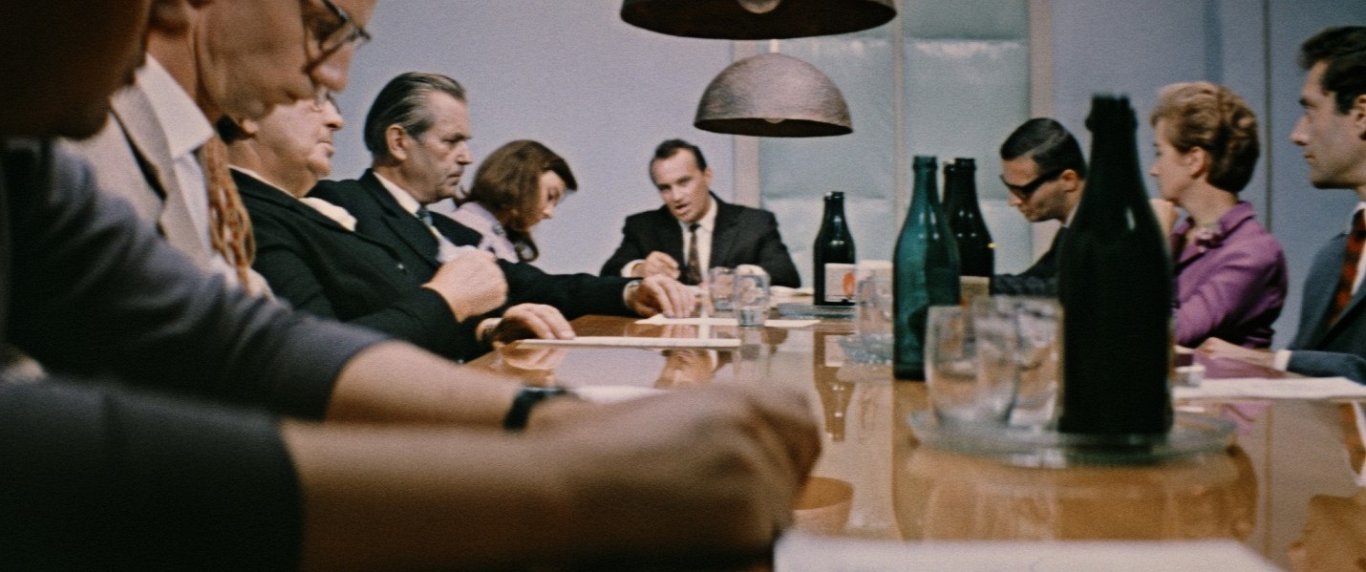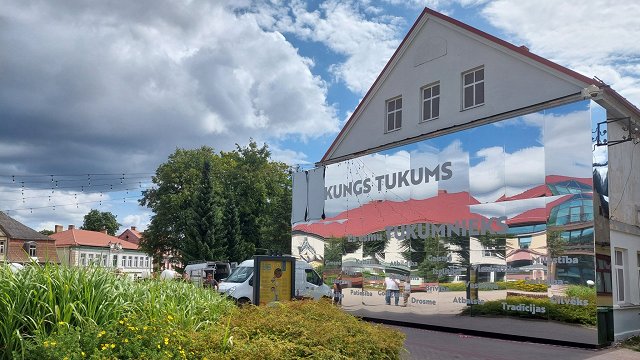This spring, one of the most exciting stories in the Latvian culture space came from the Cannes Film Festival, where the restored version of Rolands Kalniņš’ classic Four White Shirts (1967, also known in Latvian as Breathe Deeply!) – based on Gunārs Priede’s play and with a score by Imants Kalniņš – was included in the festival’s Classics program. It’s quite possibly the greatest gift on Latvia’s centenary yet. Hopefully, this will encourage those who had not heard of it – or who only know that the film's lead Uldis Pūcītis is the grandfather of the famous tennis player Ernests Gulbis – to watch it. The film defines an era – an era full of very complex, absurd decisions and censorship, but bursting with unbelievable creativity. Back then, the best ideas arose not in the name of, but rather in spite of something. It’s perhaps the era’s most innovative movie in Latvian cinema, compared by professionals to the French New Wave, which crested in the 50s and 60s of the previous century.
This period in European cinema is represented by Jean-Luc Godard, François Truffaut, Jacques Rivette, Claude Lelouch and others, with the most notable actors being Alain Delon, Jean-Paul Belmondo, Anna Karina, Brigitte Bardot, Catherine Deneuve, etc. On 24 May at the EU House, Dita Rietuma held a lecture, entitled "Latvian Films in Cannes Film Festivals". Rietuma, a cinema studies Ph.D. and the head of the National Film Centre, confirmed that the film’s cinematic language is comparable with the aforementioned golden age, and that this – along with the fact that it sheds light on the somewhat little-known space behind the Iron Curtain at the time of the New Wave – prompted Cannes organisers to select this film and include it in the classics selection of the film festival, where Rolands Kalniņš appears in a list of fifteen classic European films alongside Ingmar Bergman, Alfred Hitchcock and the aforementioned Jean-Luc Godard.
Despite the fact that comparisons such as “The Little Paris” or “The Switzerland of Vidzeme”, in most cases, testify to provincialism, this time it’s not incorrect to say Rolands Kalniņš is "our very own Godard", or to call Uldis Pūcītis the “our very own Belmondo”. Who knows, maybe if fifty years wouldn’t have passed before this moment of recognition at the European film citadel, we wouldn’t have to come up with such comparisons, as they would have been already established. As concerns Godard, one could even carry out comparative studies on the visual aesthetics, framing, editing techniques, etc.
When I try to picture how the senior Latvian grands – director Rolands Kalniņš (1922) and cinematographer Miks Zvirbulis (1937) – felt on the Cannes red carpet this May, it seems it could have been equal parts wonderful, surreal and inspiring.
In essence, it’s Latvia’s return to Europe, without the strange juxtaposition of “here at home”, “abroad” or “in the West” and speculation over archaic arguments related to “authenticity”. Rather, the film has been launched directly into a well-deserved place among avant-garde classics. On the one hand, 2018 is the moment when international professionals of the area have testified to what Latvian film professionals already knew and what connoisseurs suspected; on the other, making it into Cannes classics clearly marks a new stage in the history of the film’s screenings; this acknowledgement is a wonderful tool for international marketing, which, used correctly, could help win back the years the film was banned under censorship.
It should be added that the restored version of Four White Shirts, the work of the Studija Lokomotīve, is in colour and has removed many technical flaws, meaning it’s worth watching at the cinema. Modern technology enables viewers to enjoy the colour and the film score. Both are important to Kalniņš’ subtle and poetic cinema. This is evident starting from the film artist Ieva Kundziņa’s closing credits, written on the asphalt near the Rīga Film Studio with colourful chalk, to Pauls Butkēvičs’ songs of which many have become unofficial national hits—including "Viņi dejoja vienu vasaru" ("They Danced a Single Summer"), "Četri balti krekli" ("Four White Shirts"), and "Dzeguzes balss" ("The Voice of the Cuckoo").
And then there’s the far-off drone of a train, and the muffling of sound as a reference to the Kafkaesque nonsense of the censors’ meetings, or rather its resonance in the consciousness of Cēzars Kalniņš, the film’s protagonist. As I was writing this commentary, I asked people to name their main associations with Four White Shirts, and many could not say anything more than that they remember the title and the characters played by Uldis Pūcītis and Dina Kuple. Therefore it’s opportune to share the film’s plot. It’s about Cēzars Kalniņš, an electrician who writes songs in his free time and plays in a youth band (called an "ensemble" in the film, as was pertinent in the era). Anita Sondore, a member of the Culture Committee, hears some of the songs by accident and criticises them for being immoral, free-thinking, and corruptive to young Soviet citizens. As a result, she starts a drawn-out public debate which results the songs being censored and banned. The problem grows to absurd proportions, as the accuser herself is on the verge of becoming a defender of the ensemble.
The film is about youth, its black-and-white tendencies, dissatisfaction with the circumstances, and the unfavourable conditions for creative minds at the time when Europe was shattered by the 1968 events. However, this all takes place in a parallel universe, the inner turmoil of which was little-known or completely unknown to the world at large. Such surprises can prove to be touching for European culture, which has seemingly seen it all and where the modern trends are more related to the current hotspots, the problems of refugees and migrants, Russia’s geopolitical distractions and the outrage they cause.
The history of Latvian films at Cannes is not very long. The festival featured Laila Pakalniņa’s documentary shorts The Linen, The Ferry and The Mail in 1995 and the feature film The Shoe in 1998. In 2010, Jurģis Krāsons’ animated short To Swallow a Toad made it into the festival through a selection of 5,000 films. And that’s it. It's not so easy for a small country to compete in the gigantic film industry. That’s why it’s heart-warming that our avant-garde cinema is able to compete with undisputed film classics.


























